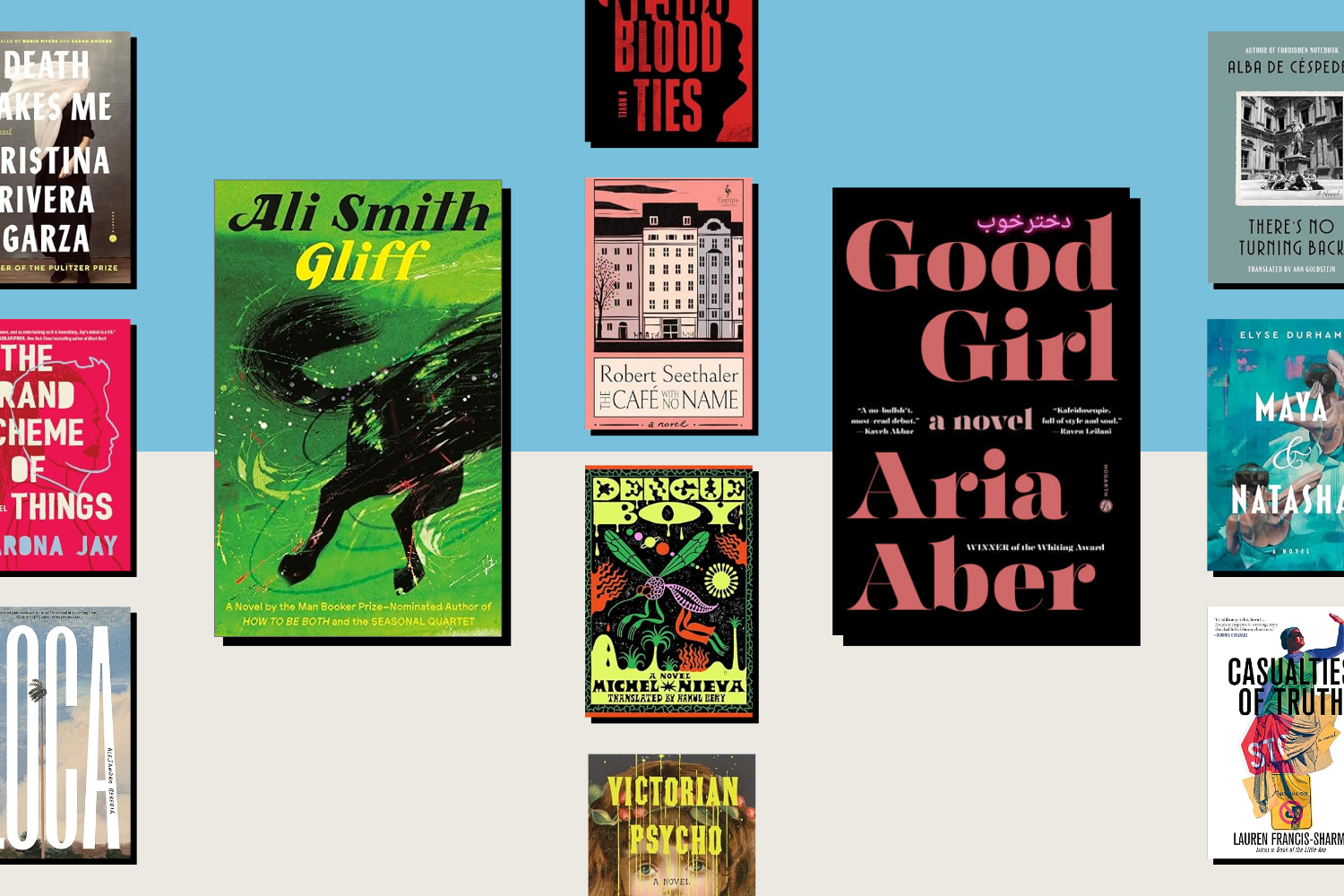The Novels We’re Reading in February

Publisher cover images
This month, we’re reading novels set against the backdrop of rising authoritarianism and right-wing extremism in Europe, from two siblings navigating near-future techno-dystopian Britain to the experiences of the daughter of Afghan refugees in 21st-century Berlin.
Gliff: A Novel
Ali Smith (Pantheon, 288 pp., $28, February 2025)
This month, we’re reading novels set against the backdrop of rising authoritarianism and right-wing extremism in Europe, from two siblings navigating near-future techno-dystopian Britain to the experiences of the daughter of Afghan refugees in 21st-century Berlin.
Gliff: A Novel
Ali Smith (Pantheon, 288 pp., $28, February 2025)
In Ali Smith’s new novel, Gliff, set in a near-future authoritarian Britain, data reigns supreme. Every place and person is meant to be charted. “Unverifiables” are rounded up and sent to reeducation centers; their homes are razed or demarcated as no-go zones. Yet the efforts to streamline society are crude, even comical. As Briar, the narrator, puts it after witnessing a worker use a clunky push mower-like tool to paint red lines around a building set for demolition: “And why are those machines they’re using so rubbish? Don’t we rate being bullied by something more technologically impressive?”
It’s a brief moment of humor that captures the irreverence of Smith, who has been called Scotland’s “Nobel laureate-in-waiting.” Smith, whose work straddles experimental and popular literature, is known for her political fiction—particularly the Seasonal Quartet, her series of novels set amid Brexit and the first Trump administration, including Summer, which won the 2021 Orwell Prize for Political Fiction.
Gliff, which follows two adolescent siblings, Briar and Rose, as they try to navigate the world as unverifiables, is no exception. The book regularly alludes to Aldous Huxley’s Brave New World, the dystopian classic published between the two world wars, a time of techno-optimism and brewing fascism. And Gliff’s “brave new unlibraried world,” as Smith’s narrator calls it, is not so different from our own. In a recent interview, Smith suggested that her book was partly a response to the loss of a library culture and the knowledge it fostered. Now, she said, we turn to the internet for “information,” and “the difference between information and knowledge is the difference between an ice covering across a really deep loch and the depth of that loch.”
Despite this bleak premise—and the mirror that it holds up to our own societies—Smith’s book is strangely playful and fable-like, marked by a reverence for childlike wonder and for language and etymology. Like the best of dystopian protagonists, Briar and Rose are children and thus attuned to the artifice and inanities of societal structures. (It helps that they were raised by a free-thinking mother who instilled in them that there are “different realities.”) Even amid terror, Gliff reminds us that it is possible to exist outside of state-sanctioned ways of being, and that “real realities of living” are worth teasing out and fighting for.—Chloe Hadavas
Good Girl: A Novel
Aria Aber (Hogarth, 368 pp., $29, January 2025)
In retrospect, the timing of Good Girl’s publication is eerie: The poet Aria Aber could not have foreseen that her debut novel would be released amid the same type of German xenophobia that haunts its pages.
A week after Good Girl hit shelves, a man from Afghanistan allegedly killed two people in a knife attack in Aschaffenburg, Germany, reigniting debates about immigration ahead of the country’s Feb. 23 election. Then, the Christian Democratic Union—which appears poised to win a plurality in the upcoming vote—broke a postwar taboo and joined forces with the far-right Alternative for Germany (AfD) to pass a contentious resolution on immigration reform. Alongside the AfD’s surging popularity, Islamophobic incidents in Germany are on the rise.
Aber was born and raised in Germany, but her parents were refugees from Afghanistan. Set about a decade and a half ago in Berlin, Good Girl follows 19-year-old Nilab Haddadi, who is also the daughter of Afghan refugees, as she suppresses her identity in a haze of drugs and sex.
When Good Girl begins, Nila—as she is called by friends and family—has just graduated from an all-girls boarding school and returned to her father’s apartment in the “nightmare of brutalist concrete and unemployment rates” that is Gropiusstadt, the “ghetto-heart” of Berlin’s Neukölln district. Nila enrolls at Humboldt University “because [she] wanted the free U-Bahn pass” and spends most of her time partying. After she meets American writer Marlowe Woods at a club, they begin a relationship defined by abuse, addiction, and codependency.
Attending private school, much less boarding school, is rare in Germany. But Nila’s parents (her mother died when Nila was 16) sent her away from Berlin because she revolted against their community’s traditional boundaries for a “dokhtare khub, a good girl.” In other words, Nila displayed a “desire for liberty and sex and wildness and alcohol.”
“I wanted love and everything around it—I what my male cousins had, which was the privilege to be unbounded by an ancient idea of honor and purity,” Nila says.
When people ask about her heritage, Nila tells them that she is Greek, Colombian, or Israeli—but never Afghan. “Within me burgeoned the shame my parents had taught me,” Nila explains; she wanted to be “anything but Muslim.” Even Marlowe does not know who Nila truly is. Her “colossus of secrets” allows her to live two separate lives and gain “entrance into a world of inclusion” for a few years—until the boundaries between Nila’s life in Gropiusstadt and the clubs of Friedrichshain crumble. Then, Nila must reevaluate her strained ties to her father, her boyfriend, and herself.
Nila’s reckoning with her Afghan identity unfolds against the backdrop of escalating neo-Nazi aggression against Muslims in Germany—and media coverage that seems to turn a blind eye to the severity of racism in the country. She recalls her self-hatred developing after the 9/11 attacks, when she “saw [her] home country mentioned on television for the first time.” But she also feels a newfound sympathy for her parents’ experience as stateless people and the rigidity that they developed while navigating a culture that was both unfamiliar and unwelcoming.
“I had gone to such lengths to separate myself from everyone and everything I came from,” Nila says. “And like so many children before me, I became my own exile.”—Allison Meakem
February Releases, in Brief
Pulitzer Prize-winning author Cristina Rivera Garza’s Death Takes Me, a genre-bending 2007 detective novel set in Mexico City, is translated into English by Robin Myers and Sarah Booker. In Botswana-born British author Warona Jay’s The Grand Scheme of Things, an unlikely pair devises a plan to upend London’s theater scene. Norwegian writer Jo Nesbo’s latest noir, Blood Ties, is translated into English by Robert Ferguson. The past comes back to haunt two friends who have left the Dominican Republic for New York in Loca, Alejandro Heredia’s debut novel. Robert Seethaler’s The Café with No Name, translated by Katy Derbyshire, revisits 1960s Vienna.
Ann Goldstein, famed for her work on the Neapolitan Novels, translates Italian Cuban writer Alba de Céspedes’ There’s No Turning Back, an experimental feminist work once banned by Italy’s fascist regime. In Spanish author Virginia Feito’s Victorian Psycho, a comedy of manners turns bloody as a mistreated governess plots her revenge. The year 2197 is a psychedelic fever dream in Argentine author Michel Nieva’s gaucho-punk Dengue Boy, translated by Rahul Bery. Twin sisters navigate the world of Soviet ballet amid the Cold War in Elyse Durham’s Maya & Natasha. And in Lauren Francis-Sharma’s Casualties of Truth, set between Washington and Johannesburg, history can’t stay buried for long.—CH
Books are independently selected by FP editors. FP earns an affiliate commission on anything purchased through links to Amazon.com on this page.
Chloe Hadavas is a senior editor at Foreign Policy. X: @Hadavas
Allison Meakem is an associate editor at Foreign Policy. X: @allisonmeakem
More from Foreign Policy
-

Russian President Vladimir Putin looks on during a press conference after meeting with French President in Moscow, on February 7, 2022. The Domino Theory Is Coming for Putin
A series of setbacks for Russia is only gaining momentum.
-

The container ship Gunde Maersk sits docked at the Port of Oakland on June 24, 2024 in Oakland, California. How Denmark Can Hit Back Against Trump on Greenland
The White House is threatening a close ally with a trade war or worse—but Copenhagen has leverage that could inflict instant pain on the U.S. economy.
-

Donald Trump speaks during an event commemorating the 400th Anniversary of the First Representative Legislative Assembly in Jamestown, Virginia on July 30, 2019. This Could Be ‘Peak Trump’
His return to power has been impressive—but the hard work is about to begin.
-

US Secretary of State Marco Rubio greets employees at the State Department in Washington, DC, on January 21, 2025. The National Security Establishment Needs Working-Class Americans
President Trump has an opportunity to unleash underutilized talent in tackling dangers at home and abroad.










Join the Conversation
Commenting on this and other recent articles is just one benefit of a Foreign Policy subscription.
Already a subscriber?
.
Subscribe
Subscribe
View Comments
Join the Conversation
Join the conversation on this and other recent Foreign Policy articles when you subscribe now.
Subscribe
Subscribe
Not your account?
View Comments
Join the Conversation
Please follow our comment guidelines, stay on topic, and be civil, courteous, and respectful of others’ beliefs.
Change your username |
Log out
Change your username:
CANCEL
Confirm your username to get started.
The default username below has been generated using the first name and last initial on your FP subscriber account. Usernames may be updated at any time and must not contain inappropriate or offensive language.